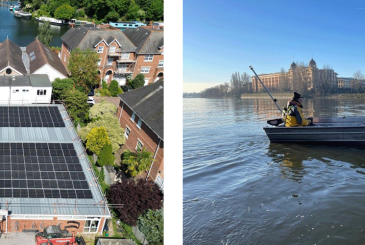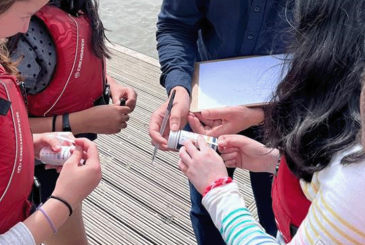From riverside bars and caravan sites or camping through to local inter-company regattas, rowing clubs are finding innovative ways of bringing in more income. Patricia Carswell finds out more
Like everyone else, rowers have had to tighten their belts this year, and more than ever, clubs are looking for ways to diversify their income and keep their operations afloat. Patricia Carswell talks to five clubs that have found innovative ways, from rowing camps to camping, to bring in extra funds.
Ross RC
It was the perfect storm of the pandemic and some catastrophic flooding that brought Ross’s latest money-making venture into being. Exiled from their riverside bar by extensive repair works, and unable to meet indoors to socialise, in July last year they came up with the idea of an outdoor bar and barbecue.
Between July and September last year they set up a large gazebo and on Friday and Saturday nights laid on a barbecue and bar. A couple of weeks ago they started it up again for the 2021 season.
“I think the record was five burgers for one person!”
Between July and September last year they set up a large gazebo and on Friday and Saturday nights laid on a barbecue and bar. A couple of weeks ago they started it up again for the 2021 season.

The venture was an unexpected hit, says David Rosser, who runs the bar. “Some nights we took as much as £1,000.” But more than just the revenue was the enjoyment of spending time together. “It was a case of bringing some revenue in and allowing club members to socialise again. Everyone felt a lot safer about being outside in what is a beautiful setting.”
Although for licensing reasons they couldn’t open to the public, they were able to make campers on their field temporary club members, and the campers proved enthusiastic participants. “They’ve worked up a big thirst and appetite,” says Dave. “I think the record was five burgers for one person!”
Tees RC
Plenty of clubs hire out function rooms for events and weddings — a riverside location makes for a picturesque and popular venue — but Tees RC benefits from venue hire in a rather unusual, roundabout way. It shares its facilities, the River Tees Watersports Centre, with other river users, including a dragon boat club and a canoe polo club, and the building itself is owned by the Tees River Users Trust, or TRUT – a not-for-profit trust.
In a slightly convoluted arrangement, the club pays a membership sub and boat storage fee to TRUT, which in turn brings in income by hiring out the upstairs bar and function room for weddings and other functions, including meetings of Stockton Council.

Club member and chairman of TRUT, Ralph Pickles, explains. “The income TRUT earns means it can charge lower membership fees to clubs, so Tees RC (TRC) members get use of a fully supplied and maintained building with all the services and support from the staff for less than it would cost otherwise. Essentially TRC’s only direct costs are for boats and boat maintenance. It lets us keep the costs of membership lower and allows us to be inclusive.”
Tees has also found rowing camps to be a useful source of income.
“We have the best rowing river in England with 20-25km of rowable river and very little other river traffic,” says Ralph. In recent years they have hosted very successful camps for clubs such as Tideway Scullers’ School, and are hoping to do more of these in future.

Durham ARC
With UK vacations now de rigueur, Durham ARC is delighted that they had the foresight, 25 years ago, to convert a spare quarter acre of their land into a caravan site. The five pitches, open to Caravan Club members only, bring in 8-10% of the club’s income, according to General Manager, Mark Bell. “It’s good money for very little effort.”
“Last year for the first time they opened their beer garden to the public on weekend evenings”
Although they were closed by necessity for some time last year, they were fully booked over the summer. “We’re hoping for a busy summer this year, too,” says Mark.

Until the pandemic struck, the club had only ever opened their bar to members and had always operated at a loss. Last year for the first time they opened their beer garden to the public on weekend evenings – a popular move that they are repeating this year.
“It’s been full so far,” reports Mark. “Last week we had our busiest week ever in the club’s history. We’ve just signed up to a table ordering system – the customers can order their drinks and food on the phone.”
As functions are out of the question for the time being, it’s less certain how much use the function room, often used as a wedding venue and for conferences, will get this year, but Mark hopes the combination of the beer garden and caravan site will keep the club finances ticking over nicely.
Auriol Kensington RC
In an arrangement not dissimilar to Tees, Auriol Kensington rents its facilities from a not-for-profit company, Auriol Boathouse Company Ltd.
In addition to rental income from the rowing club and other rowing-related properties, the Auriol Boathouse Company derives a steady, if modest, income from a trophy business founded in the 1950s, selling tankards and other silverware, mostly as prizes for rowing events (it originally bought tankards for a pound and sold them from a guinea).

The benefits to the rowing club are significant. Maintenance of the fabric of the building is covered by the company as owner of the property. As Daniel Walker, a member of the rowing club and a director of the company, puts it, “The purpose of the company is solely to support rowing. No profits come out of the company – the money goes back from the company into the local clubs.”
In the early 2000s the company financed the construction of an extra floor which the club now uses as a function room for weddings, parties, corporate events and meetings. After an enforced break, the club is looking forward to hosting its first party of the year. “We’ve got one booked, so fingers crossed it’ll happen!” adds Daniel.
Aberdeen Boat Club
Since the 1980s Aberdeen Boat Club has been holding an annual inter-company regatta that has proved an invaluable source of income. Local companies are invited to form crews of four—the only stipulation being that they must be new to rowing—and the club lays on six coaching sessions followed by a regatta for all crews. Training and racing takes place in beginner-friendly restricted boats.
As all the coaching and the event organisation is done by volunteers for the club, the only expenses are the prizes and the PA system. Crews often appear in fancy dress and there’s a disco and barbecue in the evening, as well as a well-attended bar.

At the peak of the oil and gas boom, as many as 50 crews entered and numbers had to be limited, although numbers are down since the industry crashed in 2016. “We charge £400 per crew,” says organiser Bob Newton, “and it makes up about 25% of the club’s income, excluding the increased bar turnover.”
There are benefits beyond the purely financial. Some participants stay on and join the club, and the volunteers often discover a new talent for coaching they didn’t know they had.
Club President, Jim Steel, adds, “I often meet people who remember attending years before and they have good memories of happy times. It raises the profile of rowing and the happy ambience that you get around rowing.”
Photo at Aberdeen BC: Snapper Ron










